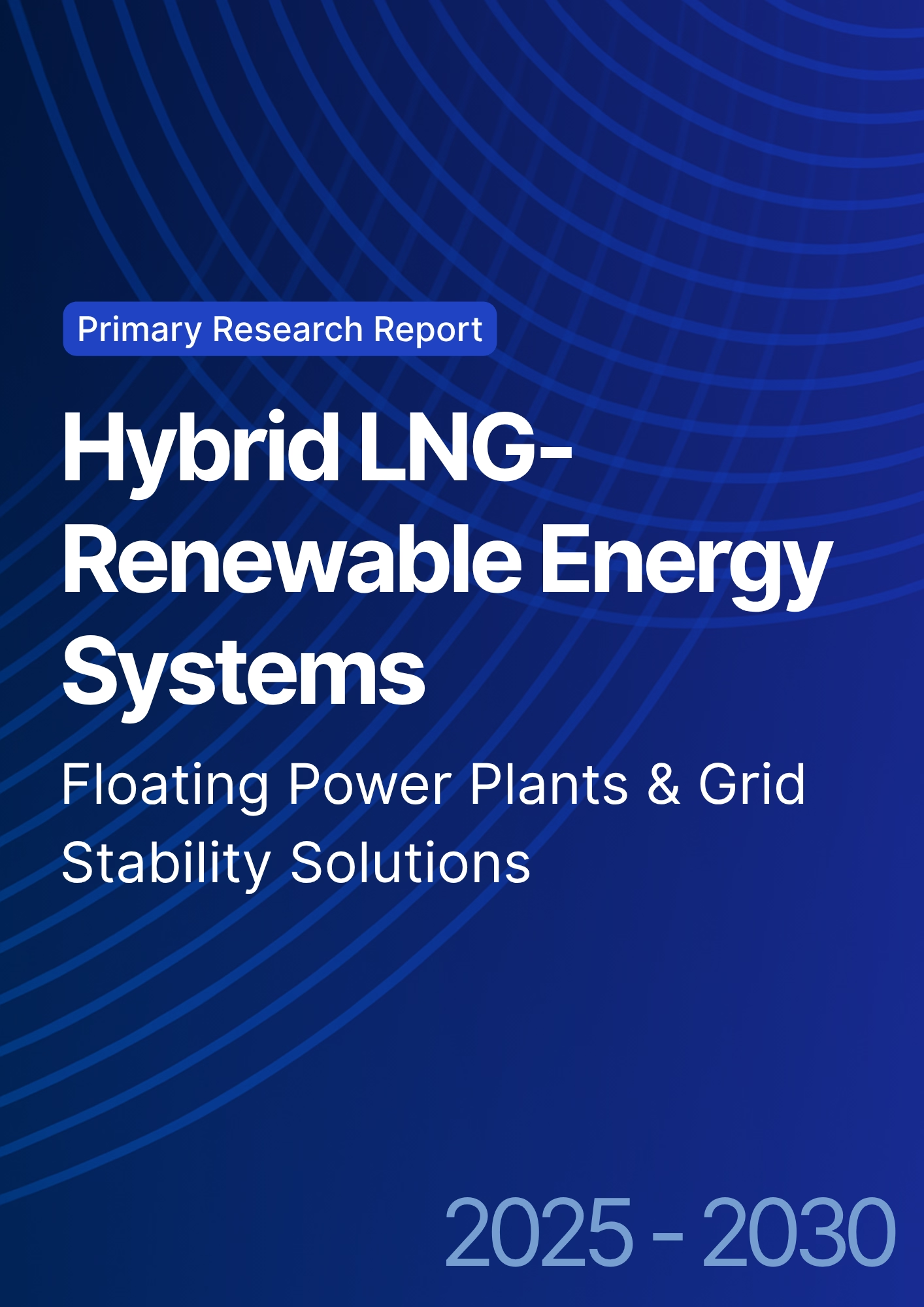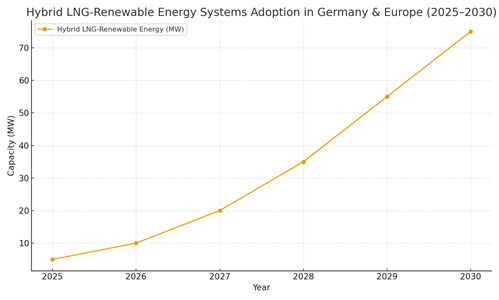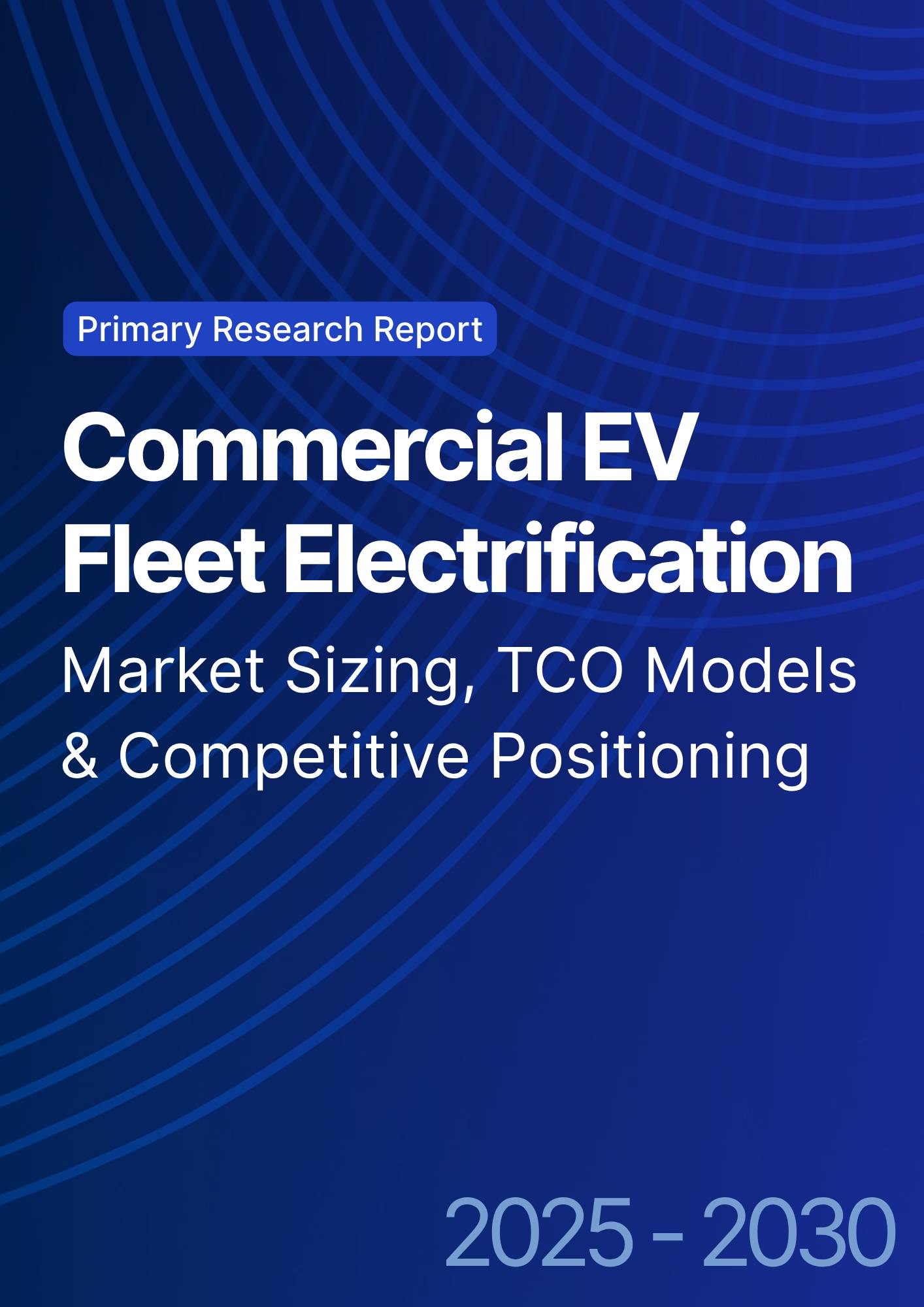

68 Circular Road, #02-01 049422, Singapore
Revenue Tower, Scbd, Jakarta 12190, Indonesia
4th Floor, Pinnacle Business Park, Andheri East, Mumbai, 400093
Cinnabar Hills, Embassy Golf Links Business Park, Bengaluru, Karnataka 560071
Connect With Us
Hybrid LNG-Renewable Energy Systems: Floating Power Plants & Grid Stability Solutions
Hybrid LNG-renewable energy systems, combining liquefied natural gas (LNG) with renewable energy sources like wind and solar, are positioned to revolutionize Europe's energy landscape from 2025 to 2030. These systems, particularly in floating power plants, offer the flexibility and scalability needed to balance intermittent renewable energy sources with the reliability of LNG. The adoption of hybrid LNG-renewable systems is expected to grow rapidly, with a projected capacity increase from 5 MW in 2025 to 75 MW by 2030 across Europe. The primary drivers of this growth will be the need for grid stability, energy flexibility, and the integration of energy storage solutions. Countries such as Germany, the Netherlands, and the UK will lead the adoption of these hybrid systems, which will help mitigate the challenges posed by fluctuating renewable energy production and facilitate smoother integration of renewables into the grid.

What's Covered?
Report Summary
Key Takeaways
1) Hybrid LNG-renewable systems will be pivotal in stabilizing Europe’s energy grid by 2030.
2) Floating power plants will play a major role in decentralizing power generation and improving grid flexibility.
3) By 2030, the capacity of hybrid LNG-renewable systems in Europe will increase to 75 MW, driven by energy storage and flexibility solutions.
4) Germany, the Netherlands, and the UK will lead the adoption of hybrid LNG-renewable systems in Europe.
5) Investment in hybrid LNG-renewable systems is expected to exceed €10 billion by 2030, focusing on infrastructure and regulatory frameworks.
6) Grid stability and energy flexibility will be key drivers of hybrid LNG-renewable energy adoption.
7) The integration of renewable energy sources with LNG will help maintain energy security while meeting decarbonization targets.
8) By 2030, hybrid LNG-renewable systems will contribute significantly to Europe’s renewable energy goals, reducing reliance on fossil fuels.
Key Metrics

Market Size & Share
The hybrid LNG-renewable energy systems market in Europe is poised for significant growth, with the adoption of floating power plants and grid stability solutions driving market expansion. By 2030, Europe’s hybrid LNG-renewable capacity is projected to reach 75 MW, up from 5 MW in 2025. The increased deployment of floating power plants will support Europe’s decarbonization goals by integrating renewable energy into the grid more effectively. Investment in hybrid LNG-renewable systems will surpass €10 billion by 2030, with key regions like Germany, the Netherlands, and the UK leading the way. These investments will help develop necessary infrastructure, including energy storage, fuel supply chains, and safety standards, which are critical for the successful scaling of hybrid LNG-renewable systems.

Market Analysis
The hybrid LNG-renewable energy market in Europe is evolving rapidly, driven by the need for flexible and reliable grid systems. By 2030, the cost of these hybrid systems will decrease due to technological advancements and increased production scale. Floating power plants will play an essential role in providing decentralized energy, especially in coastal areas with high renewable energy potential. The cost of hybrid LNG-renewable energy systems will decrease from €450 per MW in 2025 to €300 per MW in 2030, driven by economies of scale and improved efficiency in both LNG and renewable energy integration.

Trends & Insights (2025–2030)
• Hybrid LNG-renewable energy systems will become essential in stabilizing the grid in high renewable energy regions.
• Floating power plants will play a key role in integrating renewables into the energy system.
• By 2030, the capacity of hybrid LNG-renewable systems in Europe will exceed 75 MW.
• Investments in energy storage and grid infrastructure will be crucial for the success of hybrid LNG-renewable systems.
• The cost of hybrid LNG-renewable energy systems will fall, making them a more attractive option for energy producers.
• Regulatory frameworks will evolve to accommodate hybrid energy systems, providing financial incentives for early adopters.
• Hybrid LNG-renewable systems will improve grid stability and reduce energy curtailment in regions with high renewable penetration.
• The development of floating power plants will enable offshore renewable energy integration in coastal Europe.
Segment Analysis
• Energy Producers: Companies in the energy sector will adopt hybrid LNG-renewable systems to provide flexible and reliable grid power.
• Floating Power Plant Developers: Developers of floating power plants will play a crucial role in providing decentralized energy, particularly in coastal areas.
• Regulators & Policymakers: Government bodies will continue to provide regulatory frameworks and incentives to support hybrid LNG-renewable adoption.
• Technology Providers: Companies providing energy storage, grid stability solutions, and safety technologies will be critical in the development of hybrid LNG-renewable systems.
• Investors: Venture capital and private equity firms will invest in hybrid LNG-renewable systems, driven by growing demand for sustainable energy solutions.
Geography Analysis (Germany & Europe)
Germany, the Netherlands, and the UK will lead the adoption of hybrid LNG-renewable energy systems in Europe, driven by their strong renewable energy infrastructure and policies supporting decarbonization. By 2030, these countries will have the most developed floating power plants and grid stability solutions. Other European countries like Sweden and Denmark will follow, with a focus on utilizing offshore renewable energy sources and integrating hybrid systems into their energy mix. In southern Europe, countries like Spain and Italy will also adopt hybrid LNG-renewable systems, though at a slower pace, due to the focus on solar energy integration.

Competitive Landscape (Ecosystem & Delivery Models)
The competitive landscape for hybrid LNG-renewable energy systems will be shaped by partnerships between energy producers, floating power plant developers, technology providers, and governments. Key players in the hybrid energy market will include LNG suppliers, renewable energy companies, energy storage providers, and infrastructure developers. Companies that can integrate LNG and renewable energy systems efficiently and offer floating power plants will have a competitive edge in Europe’s evolving energy market. Collaboration will be crucial in ensuring the success of hybrid LNG-renewable systems, especially as Europe pushes for greater decarbonization and renewable energy integration.
Report Details
Proceed To Buy
Want a More Customized Experience?
- Request a Customized Transcript: Submit your own questions or specify changes. We’ll conduct a new call with the industry expert, covering both the original and your additional questions. You’ll receive an updated report for a small fee over the standard price.
- Request a Direct Call with the Expert: If you prefer a live conversation, we can facilitate a call between you and the expert. After the call, you’ll get the full recording, a verbatim transcript, and continued platform access to query the content and more.


68 Circular Road, #02-01 049422, Singapore
Revenue Tower, Scbd, Jakarta 12190, Indonesia
4th Floor, Pinnacle Business Park, Andheri East, Mumbai, 400093
Cinnabar Hills, Embassy Golf Links Business Park, Bengaluru, Karnataka 560071
Request Custom Transcript
Related Transcripts
$ 1445
$ 1345
$ 1432


68 Circular Road, #02-01 049422, Singapore
Revenue Tower, Scbd, Jakarta 12190, Indonesia
4th Floor, Pinnacle Business Park, Andheri East, Mumbai, 400093
Cinnabar Hills, Embassy Golf Links Business Park, Bengaluru, Karnataka 560071








.png)




